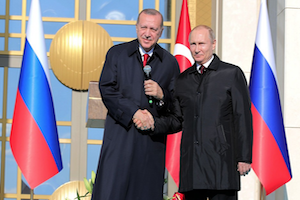The Akkuyu Nuclear Power Plant and Deepening Turkish-Russian Relations
By John C. K. Daly
July 5, 2018
For years Turkey, which imports 90 percent of its energy needs, has considered any and all options to lessen its import costs, including nuclear. The country’s energy requirements have persistently pitted the government against the country’s environmentalist lobby, one of the strongest in the Middle East. Despite such concerns, Turkey’s nuclear lobby has scored a decisive victory, as the ground has been broken for the nation’s first nuclear power plant (NPP) at Akkuyu on the southern Mediterranean coast.
Akkuyu will consist of four 1,200 megawatt (MW) VVER reactors producing a total of 4,800 MW. The Akkuyu NPP, being constructed by the Russian state nuclear energy corporation Rosatom, is projected to meet 10 percent of Turkey's future energy requirements. The first unit of the plant is scheduled to come online in 2023, with the NPP’s overall cost projected to be $20 billion.
KEY ISSUE: On April 3 President Recep Tayyip Erdoğan hosted Russian President Vladimir Putin at the presidential complex in Ankara, where they attended via teleconference the Akkuyu NPP groundbreaking ceremony, an event described by Erdoğan as a “historic moment.” Putin remarked, "It is difficult to overestimate the significance of this large-scale, innovative project. In essence, today we are not only witnessing the construction of Turkey's first nuclear power plant, but we are also creating the basis of Turkey's nuclear industry as a whole.” Despite such optimism about bringing the facility’s first reactor online in 2023, the 100th anniversary of the Republic of Turkey, as highlighted by both Putin and Erdoğan in their ceremonial speeches, it remains to be seen whether such an ambitious agenda will be fully implemented in the future.



